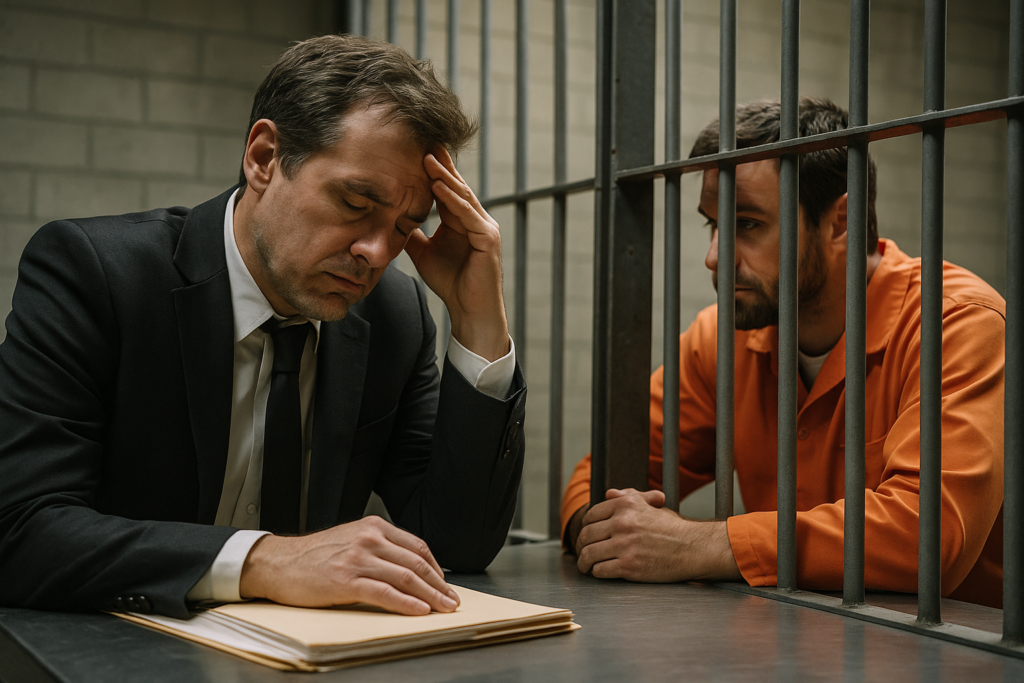Burnout—defined by emotional exhaustion, cynicism, and diminished personal efficacy—has become endemic in the legal profession. This article examines the phenomenon, with special attention to criminal defense attorneys facing unique stressors, and synthesizes strategies, protective factors, and therapeutic avenues to mitigate career burnout.
Incidence of Burnout Among Attorneys
1. High Prevalence in Legal Practice
AttorneyTherapists.com reports 40% of attorneys experience high burnout. Early-career lawyers, particularly, report overlapping symptoms of depression and occupational exhaustion within a few years of practice.
2. Contributing Factors
(a) Billable-based workload: Lawyers working 50+ hours weekly report poorer health, sleep, and social connections.
(b) Perfectionism & intellectualization: The legal education and culture valorize detachment and flawless performance—factors tightly correlated with emotional suppression and burnout risk.
(c) Trauma exposure: Criminal attorneys, especially public defenders, face vicarious trauma and compassion fatigue—with parallels to caregiving professions.
Symptomatology of Burnout
Symptoms cluster into three domains:
(1) Emotional exhaustion: persistent fatigue, irritability, emotional numbness.
(2) Depersonalization/cynicism: increased detachment, emotional distancing from clients.
(3) Reduced efficacy: feelings of ineffectiveness, cognitive distancing, reduced accomplishment.
Physical and cognitive signs—insomnia, illness, concentration issues, substance use—frequently co-occur .
Among criminal defenders, symptoms often include compassion fatigue—manifesting as emotional numbing, helplessness, and guilt from exposure to client trauma and moral injury.
Unique Stressors for Criminal Defense Attorneys
(1) Vicarious trauma: repeated exposure to graphic details, injustices, and suffering fosters compassion fatigue akin to secondary traumatic stress en.wikipedia.org.
(2) Excessive caseloads: public defenders often face unrealistic assignment volumes; e.g., Missouri defenders averaged 2 hours per misdemeanor when 12 hours were needed en.wikipedia.org.
(3) Systemic external pressures: client expectations, scrutiny, and institutional limitations often overpower their capacity to provide quality representation—undermining professional identity and values .
Recovery & Resilience: Interventions and Overcoming Burnout
A. Psychotherapy
Clinical treatments such as CBT, EMDR, and trauma‑informed therapy address root causes—emotions, interpersonal stress, moral distress—especially suited to trauma-exposed criminal defenders .
B. Coaching
Nonclinical coaching enhances emotional intelligence, goal setting, and stress management—helpful for those seeking improved work‑life integration after clinical stabilization .
C. Consulting & Systemic Reform
Firm-level interventions—flexible billing, workload management, mental-health infrastructure—are essential for preventive culture shifts.
D. Peer and Bar Association Supports
Engaging in LAPs and confidential peer networks provides critical social support and reduces stigma in seeking help.
Protective Factors Insulating Attorneys from Burnout
(1) Emotional insight and regulation: training in mindfulness, intuition, and emotional integration counteract over-intellectualization and promote resilience .
(2) Strong peer/community support: mentorship and group debriefings buffer stress and enhance connection .
(3) Meaning and value alignment: reframing advocacy as a moral strategy safeguards purpose in high-pressure practice .
(4) Organizational policies: structural reforms—workload caps, flexible hours, wellness access—reduce systemic pressure and attrition .
Conclusion
Burnout among attorneys—especially criminal defenders—is not merely a personal issue; it reflects systemic, cultural, and professional fractures. Effective intervention requires a holistic triad: therapeutic care, professional development, and institutional reform.
AttorneyTherapists.com’s blog posts, including “Recognizing and Mitigating Burnout,” “Mental Health and Substance Abuse,” and “Lawyer Mental Health and Intellectualization” provide evidence-based frameworks. When paired with bar‑association supports and leadership commitment, these measures can foster sustainable, humane legal careers.
References from AttorneyTherapists.com:
-
Recognizing and Mitigating Burnout Among High‑Performing Attorneys, https://attorneytherapists.com/recognizing-and-mitigating-burnout-among-high-performing-attorneys/.
-
The Limits of Intellect: Burnout, Depression and the Existential Crisis of Early‑Career Attorneys, https://attorneytherapists.com/the-limits-of-intellect-burnout-depression-and-the-existential-crisis-of-early-career-attorneys/.
-
Lawyer Mental Health and the Gravitation Toward Intellectualization, https://attorneytherapists.com/lawyer-mental-health-and-the-gravitation-toward-intellectualization/.
-
Mental Health and Substance Abuse Among Attorneys, https://attorneytherapists.com/mental-health-and-substance-abuse-among-attorneys/.
-
Complementary Roles of Therapy, Coaching, and Consulting in Attorney Wellness, https://attorneytherapists.com/complementary-roles-of-therapy-coaching-and-consulting-in-attorney-wellness/.
-
California County Bar Associations & Lawyer Assistance Resources, https://attorneytherapists.com/california-county-bar-associations-lawyer-assistance-resources/.
-
Attorney Hourly Billing and Negative Psychological Impacts, https://attorneytherapists.com/attorney-hourly-billing/.
-
External Validation and the Existential Crisis of the American Attorney, https://attorneytherapists.com/attorneys-and-external-validation/.








